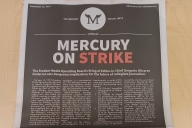You have /5 articles left.
Sign up for a free account or log in.
Federal and state regulators on Tuesday ordered a Chicago bank to pay a total of $4.1 million over its relationship with the campus debit card provider Higher One, which officials accused of misleading and deceiving students.
The Federal Reserve Board and Illinois’s Department of Financial and Professional Regulation took the action against Cole Taylor Bank, which partnered with Higher One until last August to provide college students with debit cards on which they can access refunds of their federal student aid.
Under the order issued Tuesday, to which Cole Taylor agreed, the bank will pay $3.51 million to the Federal Reserve and $600,000 to the Illinois regulators.
The agreement outlines a range of practices by Higher One, under Cole Taylor’s oversight, that regulators said were misleading and deceptive.
For example, the order says, Higher One failed to tell students how they could get their financial aid refund without having to open an account with Higher One. The order also alleges that the company didn’t properly inform students about the fees associated with the account.
In addition, regulators said that Higher One prominently displayed a college’s logo on the products and related material, “which may have erroneously implied that the school endorsed” the company’s product.
Higher One is the largest provider of campus debit cards, but it’s not a bank. The company partners with local financial institutions like Cole Taylor to offer its campus debit card products. Tuesday’s action holds Cole Taylor responsible for Higher One’s practices, but it doesn’t directly affect Higher One.
However, the Federal Reserve Board said Tuesday that it was also pursuing action against Higher One directly.
“Higher One is taking material corrective action to address these practices in its current disclosures to students,” the board said in a statement. “However, appropriate remedial actions against Higher One, including the payment of restitute for its past practices, are currently being pursued.”
Under the agreement reached Tuesday, Cole Taylor is required to assume liability of up to $30 million for any restitution that Higher One cannot pay.
Shoba Lemoine, a spokeswoman for Higher One, said Tuesday that any potential action against the company “remains an open matter.”
“We have recently made a multitude of changes to our account offerings in order to ensure the highest level of transparency and we will continue our dialogue with regulators to communicate our efforts,” she said.
Previous Settlements
Higher One last November agreed to pay $15 million to settle a class action over the company’s fees and marketing practices. A court granted preliminary approval to the settlement last month.
In 2012, the company agreed to pay $11 million in restitution to students as part of a settlement with the Federal Deposit Insurance Corporation, which had accused the company of illegal overdraft fee practices.
Policy Changes on the Horizon
Consumer advocates, Congressional lawmakers, and the Consumer Financial Protection Bureau have for several years raised concerns about the Education Department’s oversight over campus debit card products.
The department’s negotiated rule making panel last month failed to reach consensus on new rules for such products. The department is expected to move ahead, on its own, with those regulations.
Senator Tom Harkin, the Democrat who chairs the Senate education committee, has also proposed new restrictions on campus debit cards in his proposal to reauthorize the Higher Education Act. His plan calls for a ban on revenue-sharing agreements and gifts to colleges as well as new limitations on how campus financial products can be marketed to students.








